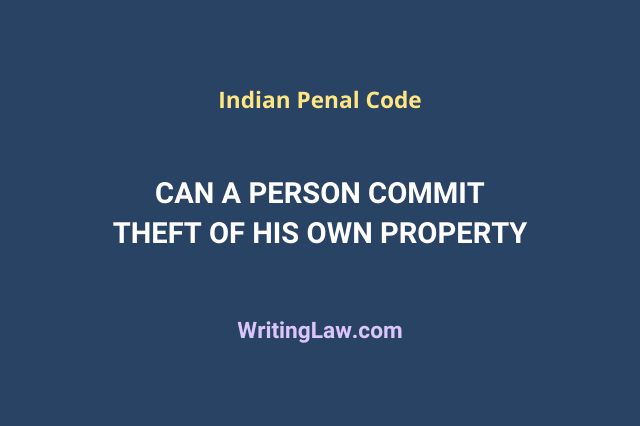
In this IPC law note, you’ll learn whether a person can commit theft of his own property or not. You’ll also see related illustrations and case laws to understand this question.
Property can be divided into two parts – movable property and immovable property.
If any offence is committed concerning any property, whether movable or immovable, it is punishable under the provisions of the Indian Penal Code, 1860.
Chapter XVII of the Indian Penal Code deals with the offences against property. A detailed description of such offences and punishment is given from sections 378 to 462 of the chapter. One of the most common offences is theft.
In this law note, we’ll take about the theft of own property under IPC.
Section 378 of IPC Defines Theft
According to section 378 of the Indian Penal Code, if a person intentionally moves a movable property to take it dishonestly out of the possession of any person without the person’s consent, the person is said to commit the offence of theft.
Essential Ingredients for Theft
1. Movable property: There must be a movable property as defined under section 22 of the Indian Penal Code. It includes corporeal property of any description except land and things attached to the earth or permanently joined to anything which is so attached to the earth.
2. Out of the possession of any person: That is control or occupancy of any object or property.
3. Dishonest intention: It means when a person (thief) intends to cause wrongful gain to one person and wrongful loss to another person.
4. Without consent: It means without a person’s will or under fear of injury or misconception of fact. It may be expressed or implied.
5. Moving or taking: There must be moving of the property with an intention to take it. The position must change.
Illustration: Rahul, with dishonest intention and without consent, takes the money out of Ankur’s possession. Here, as soon as Rahul took the money in order to such taking, he has committed theft.
Must Read: Five Elements of Theft, with Punishment and Case Law, IPC
Can a Person Be Made Liable to Commit Theft of His Own Property?
A clear answer to this question is yes. A person can commit theft of his own property too. Section 378 of the Indian Penal Code doesn’t use the word “ownership” but “possession“. It doesn’t matter whether he is the legal owner of the property or not. Here what matters is only the “possession” of a person.
Difference Between Ownership and Possession
Ownership can be defined as an absolute right and a legal owner to an object or property. In comparison, possession can be defined as physical control of any object or property.
It can be understood by the following examples:
Example 1: Ankita, an owner of a watch, delivers to Nupur to repair it. Ankita reaches the shop but does not find Nupur. So she takes away her watch out of the possession of Nupur without consent and without the intention to pay for it.
Here, though, the ownership of the watch was with Ankita, and the possession was with Nupur; when Ankita (the owner) dishonestly moves any property out of the possession of Nupur (any person) without consent, it is treated in the same manner as any other person would be treated under the law.
After seeing the above example, it can be said that it fulfils all the essential conditions for a theft to be committed. Thus it comes under the category of theft under section 378 of the Indian Penal Code.
Example 2: Anurag, an owner of a bike, gives his bike to a servicing centre for service. When he went to the service centre, the mechanic was not present at the time. So he took his bike and went away.
Here, though the bike owner was Anurag, the possession of the bike was with the servicing centre at that particular point in time. As all the essentials fit the situation, it is a perfect case of theft.
Case Laws for Theft Under IPC
Here are three important case laws relating to the theft of one’s own property:
K. N. Mehra vs State of Rajasthan (1957)
In this case, the Supreme Court held that in order to prove dishonest intention, the proof of intention to obtain wrongful gain or to cause permanent deprivation of property is not necessary. The only necessary thing is the presence of dishonest intention at the time of committing theft and not the person’s consent to whom the property belongs.
State vs Rama (1956)
In this case, the court held that a person is said to be guilty of theft if he removes his own cattle from the person to whom they have been consigned without having any recourse to the court under whose orders they were entrusted.
Veerasami Naicken vs Unknown (1930)
The court held that if a person who removes his cattle from the pound without paying the legitimate fees to the pound-keeper comes becomes guilty of theft. Pound means a place where stray animals may be officially taken and kept until claimed by their owners.
Read Next:
1. What Is Criminal Misappropriation of Property in IPC
2. What Is the Difference Between Possession and Ownership
- What Is Anticipatory Breach of Contract Under Contract Act? - 13th July 2024
- Who May File Written Statement (With Its Time Limit and Rules) - 31st May 2024
- Who Is a Legal Representative? - 30th May 2024







